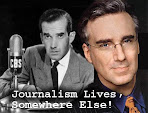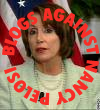Enemy of Our Enemy - New York Times
"BUSH administration defenders, right-wing bloggers and neoconservative publications are crowing about Iraqi documents newly released by the Pentagon that, they say, prove that Al Qaeda and Saddam Hussein were in league."
I haven't been visiting these sites yet, although I have read and commented on articles from The Weekly Standard by Stephen Hayes and Dan Darling. Previous posts on the subject, here, here, and here.
I think in the long run, those that absolutely refuse the possibility of any kind of tie between Hussein and Al Qaeda are on the wrong side of the argument. It is as though anything that might point to it be refuted to avoid being wrong. Bloggers are wrong according to Bergen, yet not all those involved in looking into the documents released are bloggers. Why is it a closed case according to Bergen, when so much more isn't known? Why is Bergen more the authority on this than say Stephen Hayes of the Weekly Standard? Hayes has been following this subject for a few years now.
I don't find arguments that completely deny a relationship, regardless of its depth due to the fact that it takes a certain amount of arrogance to make a call. Someone like Bergen will jump up right away and try to shoot this analysis or that analysis down as though to avoid any further clarification of the issue.
Granted, this is an editorial and this is Bergens opinion, but you know at the offset that no revelations will probably ever be seen by Bergen, nor someone like him. When it opens with, "BUSH administration defenders, right-wing bloggers and neoconservative publications are crowing about Iraqi documents newly released by the Pentagon that, they say, prove that Al Qaeda and Saddam Hussein were in league." And "the administration's reiterations of a supposed connection — Vice President Dick Cheney has argued that the evidence for such an alliance was "overwhelming" — have convinced two out of three Americans that they had "strong" links." This guy isn't looking for any truth, he's just making sure "his truth" remains intact.
I am interested in where analysis of Iraqi documents lead and hope that they help our country and the West in general in its fight against terrorism. That said, I didn't need and still don't need a "collaborative relationship" to convince me of the need to remove Hussein from power. Hussein didn't have a problem paying $25K to the families of suicide bombers in Israel, nor did he have trouble financially supporting Abu Sayyah in the Phillipines until roughly 9/11.
After over a decade of defying the UN, manipulating Oil for Food and knowing the US was a major factor in the endeavors, why would we doubt Hussein doing whatever he could secretly to strike back. Certainly after Afghanistan he wouldn't want to be overt about it, now would he.
"How did it come to pass that an opposition's measure of a president's foreign policy was all or nothing, success or "failure"? The answer is that the political absolutism now normal in Washington arrived at the moment--Nov. 7, 2000--that our politics subordinated even a war against terror to seizing the office of the presidency." - Daniel Henninger - WSJ 11/18/05
------------------------------------------------
------------------------------------------------
"the slovenliness of our language makes it easier for us to have foolish thoughts." - George Orwell
------------------------------------------------
------------------------------------------------
Tuesday, March 28, 2006
Enemy of Our Enemy - Peter Bergen
Posted by a.k.a. Blandly Urbane at 10:43:00 AM
Enemy of Our Enemy - Peter Bergen
2006-03-28T10:43:00-07:00
a.k.a. Blandly Urbane
Subscribe to:
Comment Feed (RSS)





















